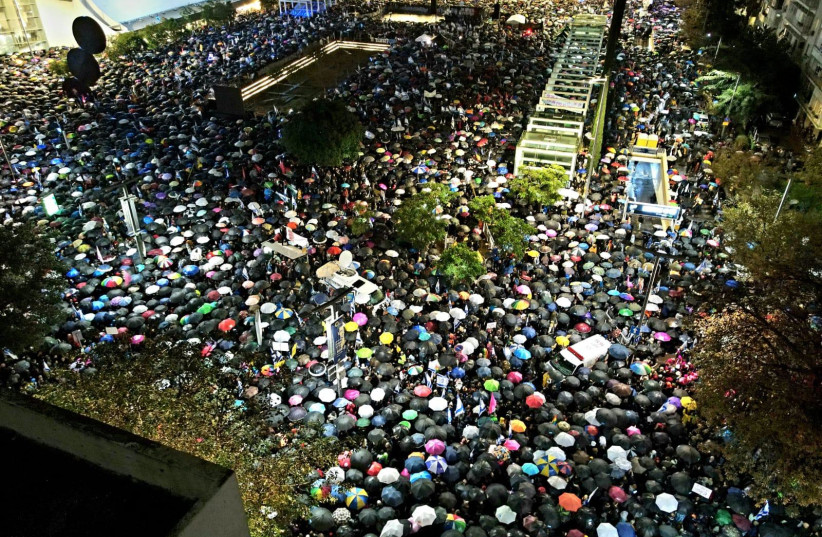Changes to the draft amendment to the Basic Law: Judiciary were submitted by Knesset Constitution, Law and Justice Committee chairman Simcha Rothman on Thursday evening ahead of this week's committee sessions.
Rothman's changes and the schedule for the committee’s sessions on the judicial reform were published just after the Attorney-General's office submitted a scathing opinion of the legal plan, and reports surfaced of President Isaac Herzog's call to freeze the legislative process in favor of political negotiations.
According the changes to the draft bill, candidates to the High Court of Justice would have to undergo a hearing before the law committee. During the previous week's sessions, judge selection hearing mechanisms had been proposed. This included hearings before the Knesset, but there was pushback to this idea.
Rothman's Thursday statement said that the changes came in response to comments by the body's legal adviser and discussions during committee sessions.
Other changes proposed on Thursday related to the composition and processes of the judge selection committee.
The new version included a provision on gender diversity, which required that there would be at least one woman among political and judicial representatives.

New amendments
Judiciary representatives on the selection committee would also be retired judges, to "expand the possibility of reaching agreed upon candidates by the Justice Minister and High Court president." Judicial representatives that do joining the committee would also have a three-year term.
The amendment also changed the voting requirements on the selection committee. The panel would have a quorum requirement of five representatives, in case of the absence of many of the committee's members.
The week's four committee sessions will likely debate the changes, as well as the Attorney-General's opinion on the reforms and the Herzog's negotiation outline.
Into the weekend, supporters of the reform continued to reject Herzog's call for talks to find compromise between political movements.
Otzma MK Yitzik Kroizer said that while he respected Herzog as an honorable person, Prime Minister Benjamin Netanyahu won the right to form the government and it was the essence of democracy that the will of the people be implemented in the coalition's policies.
Likud MK Dan Illouz said that the "attempt to move the reform debates from the Knesset" is disrespect to the parliament and the committees. "The Knesset is the people's house, where the people send their representatives and where value decisions should be made. Not anywhere else."
Supporters of the reform also struck back against the Attorney-General Gali Baharav-Miara's Thursday opinion against the judicial reforms drafts and the missive to Netanyahu on the same day, stating that his involvement with the reforms would constitute conflict of interest with his ongoing corruption trials.
Confrontation between politicians
Late Thursday night, right-wing NGO Btselmo sent a letter to the Israeli Bar Association's ethics committee arguing that any legal advice on the reforms by government legal advisers was also a conflict of interest, as the plan proposed by Justice Minister Yariv Levin in early January would directly impact their jobs. The Levin proposed to regulate the independent opinions of legal advisers, so that they must be in line with the position of the government.
At the Bat Associations winter conference on Friday, former High Court justice Menachem Mazuz said that those that don't respect the opinions of the Attorney-General's office don't accept the law. He argued the continued rejection of the A-G would result in anarchy.
"The Knesset is the people's house, where the people send their representatives and where value decisions should be made. Not anywhere else."
MK Yitzik Kroizer
Protests continued against the legal reforms on Saturday night, with major rallies in cities across Israel. On Friday, a new group of activists, farmers from the Jezreel Valley associated with Democracy Now organized a tractor convoy, arguing that they were a minority that could have their rights trampled by the government without the High Court's protections.
On Friday, The Israeli Democracy Institute published data that showed that in January 43% of Israeli citizens were against the reforms, and 31% for the reforms.
Thirteen percent of Israelis said that they had admitted to taking part in protests, the IDI Israeli Voice Index said, and 55% believed that broad protests could influence Levin's proposals.
The monthly survey, conducted by the Viterbi Family Center for Public Opinion and Policy Research, found 64% of Israelis agreed that there should be dialogue to reach a compromise on the reforms.
